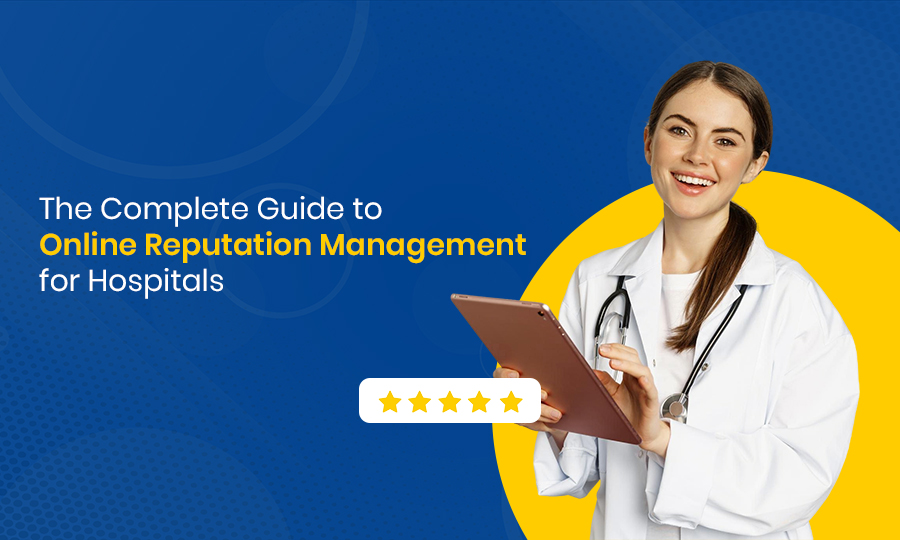When it comes to choosing a hospital for a medical need, today’s patients are more influenced by the online reputation of a hospital than word-of-mouth recommendations. Is your hospital’s online image limiting your opportunities to attract new patients? If yes, you must prioritize implementing effective strategies for online reputation management for hospitals.
Technological advancements are a constant thing in the healthcare sector! That’s what makes people turn to the internet to find a reliable hospital. The better reputation a hospital builds online, the more likely it is to attract patients and other clients.
Hospital reputation management is no longer an option; rather an essential step to ensure your hospital business growth. It will help you manage how your hospital appears across online platforms.
Want to know about these strategies and how implementing them can benefit your hospital? Explore our blog to learn the top 10 must-know strategies to manage your hospital’s online reputation like an expert.
What is Online Reputation Management for Hospitals?
Hospital Online Reputation Management (ORM) refers to the strategic process of monitoring and improving how a hospital is perceived online. It requires the hospital authority to manage their patient reviews, improve social media presence, handle online reputational crises, and build exceptional patient trust.
Hospital online reputation management (ORM) significantly influences how potential patients see your hospital before they seek any treatment service from it or visit it. In simple terms, ORM for hospitals shapes the overall reputation a hospital has in the digital age.
What does it influence? ORM for hospitals influences perceptions and opinions about a hospital within its target audience. It safeguards the organization’s reputation from potential crises and prevents severe damage. It enhances the online image of a hospital by ensuring that the right message is sent to its potential patients.
Why Do Hospitals Need a Robust Online Reputation Management Strategy?
Every hospital authority must have a strong reputation management strategy. From enhancing patient trust and acquiring new patients to boosting the overall digital image, the benefits are countless.
If you effectively implement these strategies, you can ensure achieving your desired reputation for your hospital. Identifying these reasons will help you gain a deeper understanding of why you must prioritize these strategies.
Benefit 1: Builds Client Trust and Business Credibility
Effective ORM strategies require you to generate positive reviews from your satisfied patients. When your hospital achieves higher online ratings, it will evoke higher patient trust and confidence. It will reflect more credibility and high-quality care for patients. Additionally, it will motivate patients to choose your hospital even if clinical outcomes are comparable.
Benefit 2: Helps in Patient Acquisition and Retention
Similarly, better reviews and ratings will reflect the strong online reputation of your hospital. It will help the hospital authority to acquire new patients and retain the existing ones. When your prospective patients have more trust in your hospital’s expertise, they will be more likely to choose your service over other industry competitors.
Benefit 3: Boosts Revenue and Review Volume
As you can see, every benefit of effective ORM strategies is related to the other. Better patient acquisition and retention ensure higher revenue streams. Your existing patients will reinvest in your hospital services if they have trust in your expertise. Repeat businesses are one of the main sources of a hospital’s overall revenue. Additionally, ORM strategies help you in increasing your hospital’s review volume.
Benefit 4: Improves Quality of Patient Care
When you monitor your online reputation regularly, you get to know how your patients are perceiving your services. For example, when you know that certain factors have not satisfied your patients, you can make the improvements. Similarly, some strategies are working great; you can continue implementing them. This way, you can improve your quality of patient care.
Benefit 5: Higher Search Engine Rankings
Google’s algorithm always ranks those hospitals higher with high-volume positive reviews. Google ranks them for relevant local searches, helping them attract more local prospects. Improved search engine rankings will help you enhance your hospital’s online visibility so that your potential patients can easily find your hospital online.
Benefit 6: Serves as Digital Word-of-Mouth
In previous times, most people used to consult with doctors or seek medical services from a hospital based on a referral or word-of-mouth recommendation. Online reviews serve as digital referrals and rapidly spread patient experiences. Furthermore, it works as a digital word-of-mouth recommendation that conveys the reliability and credibility of your hospital.
Top 10 Hospital Reputation Management Strategies You Must Implement
Once you build a positive reputation for your hospital across online platforms, you need to manage it properly. Otherwise, reputational crises can occur and damage your hospital’s public image at any time, no matter how stellar your hospital’s reputation was.
Managing a hospital’s online image is more than just delivering premium patient care and healthcare services! You need to follow a strategic approach to polish and maintain your hospital’s existing reputation.
From handling diverse types of reviews to building a strong online presence with engaging website content, the process of online reputation management for hospitals covers everything and beyond.
Feeling overwhelmed by all the strategies mentioned? Here in this section, we’ve discussed the 10 major hospital reputation management strategies in detail to help you strengthen your hospital’s digital image. Let’s have a look!
Strategy 1: Claim Your Hospital’s Listings in Third-party Health Directories
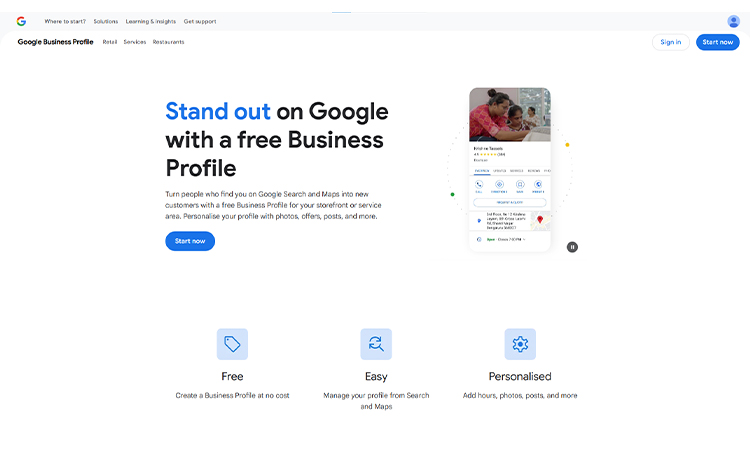
Have you listed your hospital’s profile in major third-party medical directories?
If not, you need to claim your hospital’s listings on priority! List your hospital on Google Business Profile (GBP) first, as this platform can be the most powerful tool to manage your hospital’s reputation.
Why? Because your hospital’s GBP profile is the first thing your potential patients and healthcare clients will see when they search for your hospital. By claiming your GBP profile, you can control the information about your hospital that will be displayed on Google. Managing the reputation on Google is crucial for hospitals to influence how their potential patients perceive them.
Do you know that a well-optimized GBP profile can ensure your hospital appears in the relevant local search results?
Yes, you heard that right! 46% of all Google searches are for local businesses, and this fact makes GBP an essential tool to boost your hospital’s local presence.
How to Claim a Google Business Profile for Your Hospital?
Here are some steps to claim and verify your hotel’s GBP profile.
- Sign-in – Visit google.com/business and sign in with the Google account you use for your hospital’s official purposes.
- Provide accurate details – You need to click on ‘Manage Now’ and enter your hospital’s information, such as its business name, category, address, contact details, business descriptions, and operating hours (whether your hospital provides emergency services or not).
- Add business description – Don’t forget to add your business description (keep it brief yet informative by talking about the services, departments, and other special facilities.
- Complete verification – Google can either send you a letter to your hospital’s address or email to the mentioned ID for verification. Once you receive the verification code, enter it on your GBP account to complete the verification.
- Enable messaging – Always enable messaging in your GBP profile, so that your prospective clients can directly send messages to your team for appointments and queries.
- Highlight hospital affiliations – You must mention your hospital affiliations for the physicians who work with your organization to improve the searchability of their profiles.
- Offer insurance details – List the medical insurance plans your hospital offers to help your patients confirm coverage.
A Pro Tip for You! Hospital authorities must add high-quality photos of their facilities, departments, staff, and equipment to showcase the environment that potential patients can expect. Additionally, they must share news, event details, and health tips through Google posts to keep the audience engaged.
Top 3 Online Healthcare Directories You Must List Your Hospital in
Apart from Google Business Profile, you must get your hospital listed in the popular third-party health directories as well.
- WebMD Care
This reputation management platform offers high visibility to the listed hospitals. You can boost your hospital’s reputation by using WebMD’s comprehensive suite of tools. By listing your hospital in WebMD Care, you can directly influence how prospective medical clients perceive and find your hospital online.
- Healthgrades
It’s a popular platform where you can list your hospital to showcase the brand credibility and strengthen its online reputation. The platform is a highly trafficked healthcare-specific site, and a well-optimized profile on it can help you in patient acquisition. and online reputation management.
- Vitals.com
Do you know that this platform sources patient insights from public records? Vitals has a large user base and serves as a patient review and healthcare service/organization comparison site. You can manage your hospital’s online reputation and acquire new patients.
Through the listing on Vital, hospital authorities can provide accurate information about their service and facilities to potential patients who solely rely on online sources to make their medical decisions.
Follow the process mentioned below to claim your hospital’s listings on these third-party directories.
Visit the official sites of these platforms > navigate the ‘Claim profile’ or ‘Are you the provider’ button > select the option to manage the listings of your hospital > follow the prompts and enter the verification details (e.g., hospital license, business credentials, National Provider Identifier documentation) > create an account by providing the basic details about your hospital.
Strategy 2: Create Informative and Engaging Content for Your Hospital Website to Improve User Experience
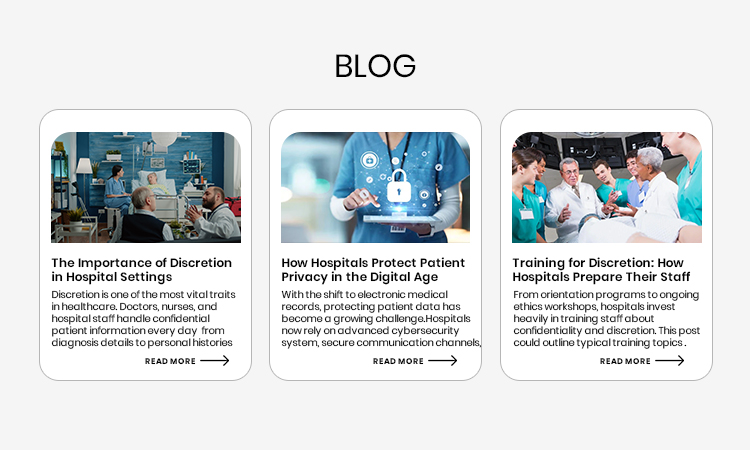
This is another significant strategy for online reputation management for hospitals.
What you publish on your website matters the most in driving real traffic to it. If you’ve just started with your hospital and are new to the healthcare industry, you must prioritize developing engaging content for your hospital website.
According to the MedCity News article, 60% of people are more likely to search for a new healthcare provider through the organization’s websites.
If these potential clients find insufficient content and information on your hospital site, they may choose your market competitor to seek their medical services. Now you can imagine why website content plays a major role in building your hospital’s online reputation.
Types of Content You Must Publish to Boost the Reputation of a Hospital Website
The following are some major types of content that you must have on your hospital website.
- Patient Success Stories: Hospital authorities can share inspirational and genuine patient testimonials. It’s best to showcase a patient’s emotional journey from initial diagnosis to receiving successful treatment services from your organization. We suggest you incorporate authentic and unposed photos of the patients to add credibility, but you must obtain permission from the patients to use their photos for promotional purposes.
- Physician and Staff Profiles: Want to humanize your hospital and impress potential clients on an emotional level? Features photos of your doctors, nurses, and other major staff members. You must include their credentials, medical expertise, academic achievements, and specializations in patient care.
- ‘About Us’ Section: Keep this specific page transparent and simple, highlighting your hospital’s mission, vision, and values. Don’t forget to mention your hospital’s key milestones, awards, accreditations, and community involvements.
- Educational Video Content: Short-form videos boost audience engagement! Consider creating short yet engaging videos to explain complex medical procedures or topics in a visual format. Sharing animated videos on your hospital website can be a great idea to increase engagement or host a ‘Meet the Doctor’ video series. You can also shoot such videos to provide your potential patients with a virtual tour of your hospital.
- Interactive Content: When people visit your website, they will prefer to engage with your content actively. Thus, you must incorporate quizzes, polls, live Q&A sessions, and checklists to improve user engagement. Consider adding a ‘Symptom Checker’ or ‘Find a Specialist’ interactive map to your hospital website. This is one of the most effective ways to gather your patient feedback and perform sentiment analysis of your potential clients.
- Doctor’s Blog: Every hospital website must have a blog section where they can publish informative content related to their services, medical procedures, treatment journeys, patient stories, and health tips. It’s all about identifying the right topic relevant to the target audience’s interests and concerns. Optimizing the blogs with relevant keywords can also help you boost your website’s SEO by improving its online search rankings.
What else is important? Apart from your website content, it’s the user experience that impresses most of your visitors and influences them to stay longer on your website. An outdated and non-mobile-friendly website may not leave a good impression on your visitors, no matter how informative the content you’ve published.
Your website must be modernly designed with exceptional in-built features and a user-friendly interface.
Check whether your hospital website –
- Is your hospital website mobile responsive?
- Is it easy to navigate for your users?
- Does it have a simple and uncluttered design?
- Can patients effortlessly book an appointment by clicking a call-to-action button?
- Does your website clearly communicate the exceptional services and facilities your hospital offers?
- Does your hospital website seamlessly integrate with your healthcare CRM?
When a potential patient visits your hospital website and has a great experience navigating it, it will grow their interest in seeking medical care services from your hospital.
The ultimate goal is to revamp your hospital website to make the visitors feel satisfied with their online experience and influence them to book an appointment at your hospital.
Strategy 3: Get Your Hospital Listed on Top Online Review Sites
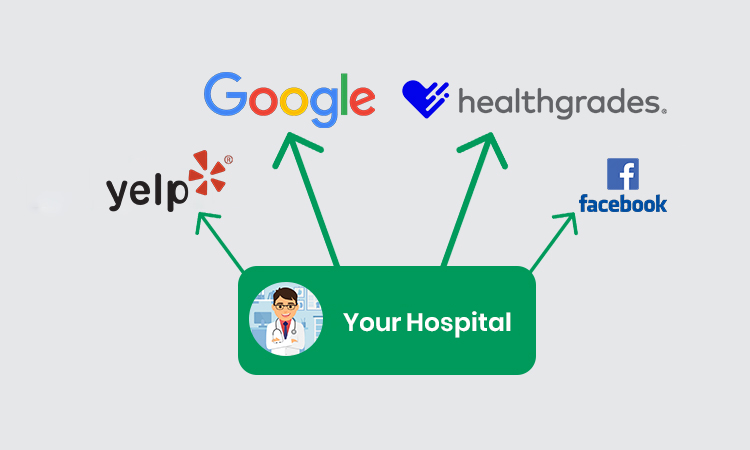
You already know that it’s important to claim a GBP profile for your hospital’s positive online presence, right?
But do you know which other online platforms your hospital must have an account on apart from Google Business Profile?
There are some top online review sites that most people use to share their valuable feedback regarding any company/organization, or service, such as Yelp, Google, Facebook, and Healthgrades. Having an account on these platforms can help hospitals gather patient feedback across various online channels and improve their online visibility as well.
Let’s check the four major review sites where your hospital must be listed.
- Yelp:
It’s one of the most popular business review sites where many patients share their experiences of seeking services from a hospital. The site has nearly 308 million reviews from its worldwide users. A surprising fact, right?
Claiming a profile on Yelp can help you showcase your hospital’s credibility and stellar reputation. Effective Yelp review management strategies can also add a feather to your efforts to improve your hospital’s reputation.
- Google:
Apart from being a top search engine, Google also excels as a major online review site. As we already said, a well-optimized Google Business Profile is a must-have for a hospital.
A 2025 Wiser Review site reveals that 88% potential customers read Google reviews to decide the quality of a local business before engaging with it. So if your hospital offers local services, you must claim your GBP account. The reviews your hospital will receive on Google will prominently appear in search results and on Google Maps.
- Healthgrades:
It is one of the most popular healthcare-specific review sites that provides crucial information about hospitals, such as years of delivering patient care, expertise, and patient ratings. The platform provides ratings and awards to hospitals based on the risk-adjusted mortality and complication rates.
The platform uses a clinically validated methodology to rank these hospitals into ratings and recognize the top performers in specialty care.
- Facebook:
We all know the wide audience base this specific social media platform has! But Facebook is also an extraordinary social media review platform that you can utilize for online reputation management for hospitals.
Facebook has billions of active users! It enables the hospitals to share updates, run ad campaigns to promote their services, and receive patient reviews. The authorities can also promote patient testimonials and treatment success stories to attract potential patients.
How will you choose the best online review platform for your hospital?
If you have this question in mind, then don’t worry! We have some tips and tricks for you to help you choose the most suitable review platform for yourself.
- Identify Relevant Sites: You must identify the review sites that are most influential in your healthcare specialty and the region where your hospital is located. Review platforms like Healthgrades and RateMDs are some popular choices for hospitals.
- Complete Your Company Listing: As a hospital authority, you must provide comprehensive information about your organization, such as the areas of your hospital’s specialization and unique facilities. It’s crucial to help your potential patients easily find you online.
- Encourage Feedback: Regardless of the platform you choose to focus on, ensure that you encourage satisfied patients to share reviews on that specific site. This tactic will help you boost your hospital’s online visibility and reputation.
Strategy 4: Generate and Respond to Online Reviews
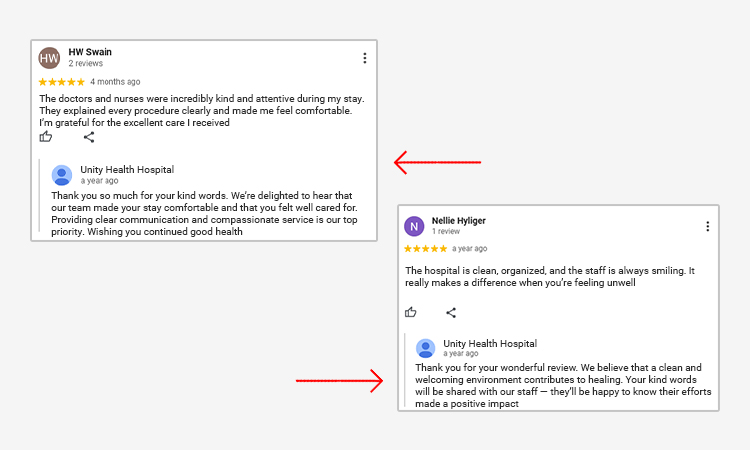
Have you ever scrolled through online reviews before making an appointment at a hospital?
We all do the same nowadays! People no longer rely on their family and friends’ recommendations, but prefer to check reviews of hospitals before seeking medical services from one. Just like positive online reviews can attract more patients to a hospital, negative ones (especially those left unchecked) can erode patient trust in its reliability.
This is where online reputation management for hospitals comes in.
Effectively managing reviews is a huge part of hospital reputation management. The following are some essential strategies that you can implement to impactfully manage your patient reviews and strengthen your hospital’s reputation online.
6 Useful Methods to Generate More Patient Reviews
According to a 2020 study, 71% of patients are more likely to check online reviews as the very first step to find a new doctor.
Having a noticeable number of positive reviews across online platforms can actually showcase a hospital as more reliable and credible.
Now the question comes – how can you collect reviews for your hospital? Let’s unveil the secrets here!
- Consider Post-Visit Survey
You can use various platforms to send a satisfaction survey to the patients or their caregivers after every visit. If you don’t receive a reply from their end, you must send a gentle reminder to leave an online review on your review page. Furthermore, you can consider sending automated review requests by preparing post-visit review request messages in advance.
A True Fact: Sending a review request just after a patient receives a treatment service from your hospital will influence the satisfied patients to leave positive feedback.
- Make the Review Submission Process Easy
If your patients can seamlessly share their reviews about your hospital, you’re good to go!
Here’s what you can do to make the review submission process easier.
- Provide direct links to your preferred online review platforms through follow-up emails and text messages.
- Don’t make the patients fill out lengthy forms with multiple verification steps.
- You can develop a dedicated review page on your hospital’s official website and ensure it’s easy to access and secure.
- Express Your Gratitude
Always thank your patients who have taken out their valuable time to share their feedback regarding your hospital. It will reinforce positive experiences and encourage other patients to review your hospital as well.
Example of a response to a positive patient review:
“We’re delighted to know that our treatment services satisfied you beyond your expectations. Thank you so much for sharing your kind words!”
- Train Your Staff to Gather Feedback
Don’t have enough time to ask your patients to share reviews online individually?
You can train your hospital staff or patient support team to ask every patient they discharge to share their treatment experience online. It will ensure a consistent and positive patient experience! You can organize such training sessions and make your staff learn how they can effectively communicate with patients about sharing online reviews.
- Respond in a HIPAA-compliant way
This is another crucial aspect of hospital reputation management. As a hospital authority, if your review responses are not HIPAA compliant, it can cause serious reputational damage to your organization.
Always remember: Do not share any critical patient details while responding to their online reviews.
Here’s what you shouldn’t mention while responding to your patients’ reviews online.
- Name of the patients
- Email ID
- Phone number
- Birthdate
- Test results
- Medical details
- Appointment dates or times
- Diagnoses
| HIPAA-compliant Patient Review Response | NON-HIPAA-Compliant Patient Review Response |
| “Thank you for sharing your feedback. We apologize for any inconvenience and are eager to know how we can resolve the issue. We aim to provide satisfactory medical services at our hospital. Please contact our team (phone number or email ID) for further discussion.” | “Hey (patient’s name), we apologize for the inconvenience you experienced with the maternity care services you received from our hospital. Please let us know how we can fix this issue.” |
- Automate Your Review Responses
If your hospital staff are busy scheduling appointments and providing the best services to the patients, it’s a great idea to automate the process of review responses.
This way, you will not leave any opportunity to impress your patients after they visit your hospital. And you don’t need to worry about remembering every reviewer and sending these responses after receiving every review.
6 Helpful Ways to Handle Negative Reviews
Have you heard about ‘turning lemons into lemonade’?
Responding to negative reviews is just like that. Receiving negative reviews from your patients is quite common for hospitals. How the authorities react to them is what matters!
Handling negative reviews is a crucial strategy for online reputation management for hospitals.
Actually, you can use negative reviews as an opportunity to grow your hospital and improve your patient service. Addressing the right concerns and taking necessary actions are the two ultimate steps you must take to prevent reputational damage to your hospital.
- Respond Promptly and Professionally
Prompt responses work best for negative reviews. You must respond to the negative reviews within 24-48 hours of receiving them. That’s how you can show value to your patients and your eagerness to address their concerns.
- Acknowledge Patient’s Experience
Without arguing with the reviewer, you must acknowledge their concern. Always show empathy and gratitude for their feedback. Avoid using defensive language and short sentences in your response. If you have something crucial to highlight, put those facts first in your response.
- Handle Things Offline
Are the things going out of your hand?
No worries! You can handle the matters offline to avoid having conflicts with the reviewer on a global platform. To handle complex issues, you can invite the reviewer to privately discuss the issues through a phone call or an email conversation. Why? It will protect your privacy and the hospital’s reputation.
- Offer Right Resolution and Follow-up
Always ensure offering a good solution to your patient’s problem. You must explain how you’ve planned to make things right. It will showcase your dedication to providing the best patient care. Once the issue gets resolved, don’t forget to follow up with the patient to confirm their satisfaction.
- Prepare for Escalation
While dealing with a negative review, you should always be prepared for further escalation of the issues. A negative review can escalate into a public relations crisis, and for such matters, you must publish a public statement and a sincere apology.
Don’t forget to highlight the steps that you will take to address the concerns raised in the negative review.
- Apologize if Necessary
An apology can help your hospital go a long way. If you find your patients’ complaints legitimate, you must offer a sincere apology to restore their confidence in your hospital’s reliability. When you apologize, it shows how much you value patients’ satisfaction.
Can a professional help work?
Hiring a reliable online review management agency is a great idea, though!
Such agencies often have an expert team with skilled online reputation management professionals who will help you build and maintain your hospital’s online image.
Strategy 5: Create Location Pages in Your Hospital Website
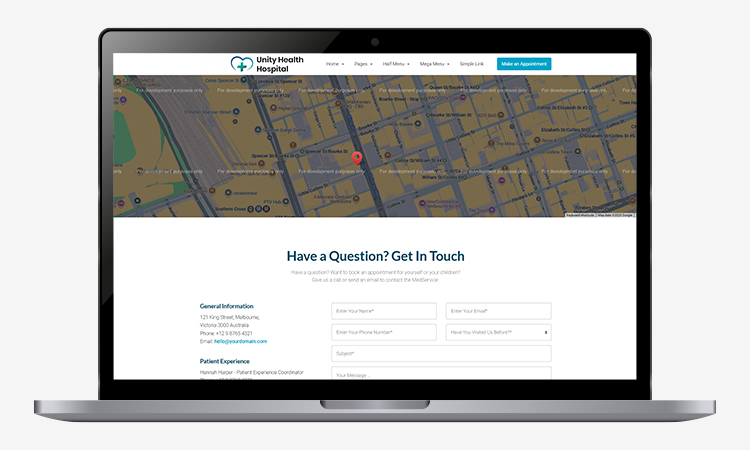
This is the best strategy for multi-location hospitals.
You can develop a dedicated page on your hospital website for each location within your network. It is possible that not all your hospital branches don’t offer the same medical care services. Developing multiple location pages can help you outline specific services available at a location.
So the patients seeking healthcare services in specific locations can easily find the medical services they need.
For example, a patient who wants to book an MRI search online for a relevant hospital near his/her location. When they visit your location pages, outlining the MRI service available in one of your hospital branches nearest to the patient’s location, it will increase the likelihood of them choosing your hospital’s services over others.
Strategy 6: Prioritize Profile Pages for Your Hospital Practitioners
Every hospital has a big team of skilled healthcare professionals. But do your patients have an idea of all of their expertise and achievements?
If not, it’s time to create a profile page on your website for your hospital practitioners. You can create separate profile pages for doctors, surgeons, therapists, and any other professionals who work in your hospital.
The page will showcase their expertise, academic achievements, professional working experience, and more. This way, your potential patients will have a clear idea of who they will be receiving medical care services from.
Strategy 7: Showcase Your Success Stories

Received positive reviews?
Let those testimonials talk about your hospital’s reliability and credibility on your behalf.
You must feature the positive patient feedback and a diverse range of successful treatment cases on your hospital website and social media business profile. However, you should take proper permission from the patients before promoting their reviews. Those real patient stories will reflect why potential clients should trust your hospital.
Trust us, it’s one of the best ways to humanize your brand!
Strategy 8: Improve Your Hospital’s Social Media Presence
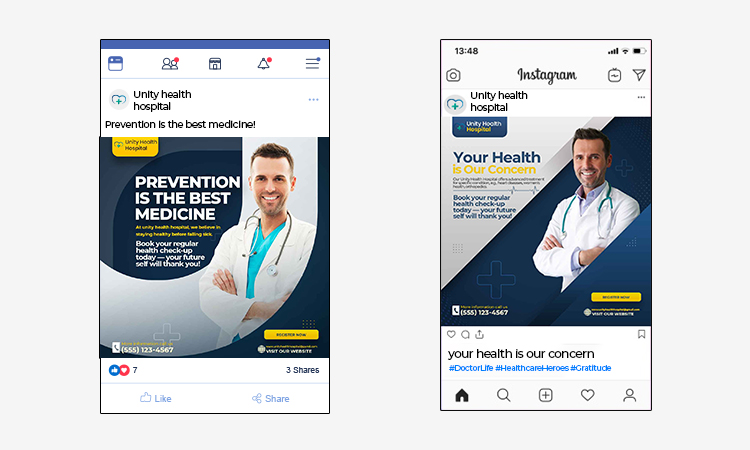
Do you know that a noticeable social media audience base can take your hospital’s reputation to a new height?
Here’s how you can utilize social media to elevate your hospital’s online image.
- Regularly post updates regarding events, health tips, new treatment service launches, and behind-the-scenes glimpses across popular social media platforms.
- Don’t avoid responding to every comment your business profile receives on social media.
- Participate in engaging conversations with your followers and share success stories to showcase the quality of patient care your hospital offers.
- Keep your social media posts simple, understandable for all types of audience demographics.
Why should you prioritize social media reputation management strategies for your hospital?
Today’s patients prefer searching online for medical organizations like hospitals. When you implement effective social media reputation management strategies, it improves your hospital’s visibility in the social media world.
Do you know that 84% of patients tend to use social media to seek medical information and connect with healthcare organizations?
Thus, a well-optimized social media presence can be a game-changer for your hospital’s digital reputation. Wondering what to post? Check out the list below.
- Short video showing health tips
- Medical myths and real concepts
- Frequently asked questions
- Expert explainer videos
- Live Q&A sessions with your hospital practitioners
- Patient testimonials
- Updates about donation drives, events, workshops, and medical fairs
- Staff highlights
- Virtual tours
Strategy 9: Handle Reputational Crises like a PRO!

As a hospital authority, you can experience a mild to major online reputational crisis. And it’s quite normal!
You must have a proactive and multi-stage plan to deal with a reputational crisis. In rare cases, even a small negative review can cause a major public issue. You never know what situation is waiting! Thus, it’s wise to be prepared for every type of situation well in advance.
Because you must prioritize a robust crisis management plan for your hospital even before a crisis occurs.
- Pre-crisis plan:
- You must identify and train your dedicated team, who will handle the crisis.
- Create a team with expertise in public relations, legal counsel, risk management, and clinical departments.
- Distribute responsibilities among the team members to ensure a clear chain of command.
- Designate a spokesperson on your hospital’s behalf; try to choose the one who is trained to speak to the media and the public.
- Identify your hospital’s potential vulnerabilities, like data breaches, poor medical treatment, or patient safety issues.
- During a crisis:
- Collect and verify evidence to prove your hospital’s credibility and reliability before you make any public statement.
- Issue a public statement to acknowledge the incident and explain the action you will take to resolve the issue.
- Don’t forget to notify your stakeholders, from patients and internal staff to other medical clients, before they hear it from the media.
- Communicate with your patients by maintaining transparency and empathy. Always address the situation with utmost honesty and compassion.
- Approach the crisis following a strategic way and offer consistent messaging to the media outlets.
A Pro Tip For You! Never release statements like ‘No Comments’ as it may appear like a cover-up.
Strategy 10: Monitor Your Reputation Regularly

The digital world never sleeps!
Your monitoring efforts will not shine if you stop monitoring the results regularly. You must check popular platforms like Healthgrades, Yelp, Google Alerts, and social media pages for tracking your hospital’s online mentions.
Follow these methods to track your hospital’s reputation.
- Set up Google Alerts: You must set up Google Alerts by keeping the ‘Mentions’ tab on for your hospital’s name, services it offers, and the key professionals associated with your organization.
- Use an ORM software: You can build such a tool with the help of your in-house team or hire a professional online reputation monitoring agency to seek their services. Their team will handle monitoring the online reviews your hospital receives, posting on social media platforms, responding to feedback, and following up with review requests. They will also develop personalized strategies based on your ORM efforts.
- Schedule Regular Check-ins: Consider weekly tracking of new patient reviews and social media comments across all major platforms. It will help you keep track of how well or poorly your online reputation management strategies are performing.
Use Google Alerts or ORM software to proactively track your hospital’s reputation in real-time.
6 Challenges You Can Face while Managing Your Hospital’s Online Reputation
While the hospital online reputation management offers an extensive list of benefits, it comes with some unique challenges too!
Now that you’ve a clear idea of how to manage your hospital’s online reputation, it’s time to reveal some common challenges that you may face during the process. Identifying these challenges will help you be prepared with some effective precautions to prevent extreme reputational damage to your hospital.
- Responding to Negative Reviews in a HIPAA Compliant Way
Every hospital can face backlash, online criticism, and receive negative reviews.
It’s quite common! But what is critical is how the authority reacts or responds to it. Do you know that hospital authorities must respond to a negative review in a HIPAA-compliant way?
Yes, you heard that right! While you must maintain transparency, you need to prioritize stringent patient privacy regulations while responding to negative feedback. We’ve already mentioned above in the blog how you can respond to reviews in a HIPAA-compliant way.
As a healthcare service provider, you shouldn’t reveal any crucial health information while responding to the review. Maintaining legal compliance is crucial to keep your patients’ trust intact.
- Lack of Dedicated Staff with Proper Knowledge and Expertise
Many hospitals lack a team of skilled staff or specialized departments dedicated exclusively to their online reputation management.
On the other hand, effective online reputation management requires proper knowledge, skills, and expertise. If you don’t have dedicated staff, you may face difficulties in tracking, engaging, and capitalizing on your patient feedback. It will affect your overall reputation management efforts.
- Inconsistent Review Collection
Is your hospital a multidepartment organization? Does your hospital have multi-location branches?
If yes, it is more likely for your hospital to have disparate patient experiences and review collection. Sometimes, it becomes a tactful job to consistently gather reviews from patients across all your departments and branches.
It requires a large team that will handle the review collection process. The inconsistency often makes it challenging for hospital authorities to get a consistent view of their patient satisfaction.
- Increasing Number of Fake Reviews
Do you know that an average of 30% of online reviews are more likely to be fake or inauthentic?
In today’s highly competitive digital scenario, the likelihood of receiving fake reviews has increased in the last few years. Market competitors can often engage in fraudulent activities like spamming a hospital’s online profile with too many fake reviews. In such cases, fake reviews can harm a hospital’s online reputation and credibility if left unchecked.
- Poor Utilization of Positive Reviews
Gathering a noticeable amount of positive reviews is not enough!
You need to know how you can effectively utilize these reviews to grow your hospital and improve its online reputation. Most hospital authorities make the mistake of not properly using their patient feedback after collecting it.
This often leads to lost business opportunities to attract new patients and retain the existing ones. Promoting positive patient reviews across various online channels can help you showcase your hospital services as reliable healthcare resources.
- Major Crisis Events (e.g., COVID-19 mismanagement, strikes, etc.)
Major medical crises like the COVID-19 pandemic have made it difficult for hospitals and other medical organizations to manage resources and communicate with their patients effectively.
The intense stress of the crisis often erodes patient trust!
Similarly, systemic issues of hospitals got exposed online as today’s patients use online platforms to report issues like long wait times, poor patient care, staff shortage, and inadequate medical equipment.
Situations like a pandemic and industrial strikes often boost the spread of misinformation and conspiracy theories across social media and online channels. This often leads to increased public anxiety and stress. Strikes can cause medical service disruption in a hospital, resulting in patient dissatisfaction.
Hospital Reputation Management Platform and Tools You Must Prioritize
Strategies for online reputation management for hospitals can offer more benefits if you utilize the right tools and technologies.
Proper utilization of certain tools can help you boost and reach the highest potential of your ORM efforts.
Want to know which tool can offer the majority of benefits? Here we’ve divided some tools based on their function and category. Explore the list below and choose the tool that suits your hospital online reputation management needs the most.
- Review Monitoring Tools
| Tools | Function |
| Podium | Mostly focuses on text-based patient communication Helps in genuine review generation from patientsIdeal for healthcare service-driven hospitals that are new to the industry |
| BirdEye | An AI-powered tool Helps in creating and scheduling social posts Monitors reviews across various online channels |
| ReviewTrackers | Comprehensive platform for multi-location hospitals Can aggregate reviews from hundreds of online sitesCan be used to analyze patient sentiment |
- Social Listening Tools
| Tools | Function |
| Mention | A social media monitoring tool Best for tracking brand mentions across social media and other online channelsCan also track online conversations |
| Sprout Social | A social media management tool that offers features like social listening Can be used for managing the online reviewsAnalyzes client sentiments by examining the reviews and social media comments |
| Sprinklr | Provides extensive data coverage across 30+ online channels Offers advanced AI features Helps in analyzing visual and text |
- Patient Feedback Platform
| Tools | Function |
| Press Ganey | Can help hospitals conduct patient experience surveysCollects patient feedback through mailed surveysUses a scoring system to measure satisfaction with hospitals and their services |
| NRC Health | An American healthcare company that offers patient feedback systemsStandardizes patient and staff feedback through customizable scripts and issue routingOffers Self-Service Feedback Tools via QR codes or text |
| Curogram | Automatically gathers reviews on sites like Yelp, Google, and HealthgradesHas a private feedback filter to address negative experiences internally |
- SEO & Analytics Tools
| Tools | Function |
| Google Alerts | Automatically monitors the web for any mention of your hospitals, key physicians, or services Can set up alerts for your hospital name and your competitors Can help in addressing negative reviews and responding professionally |
| SEMrush | Can be used for competitive analysis and keyword research Helps in identifying high-volume, low-competition keywords that potential patients are searching for |
| Google Analytics | Tracks the hospital website’s performance and user behavior Provides data on website traffic, user engagement metrics, and conversion rates |
Conclusion
Just like any other medical organization, hospital authorities also must prioritize their online reputation to grow their business. It requires constant effort, a proactive and strategic approach, and adequate time to achieve your desired online image for your hospital.
We hope that exploring our blog has helped you get a clear idea of the strategies of online reputation management for hospitals. Follow these techniques and witness the exceptional online reputational growth of your hospital.
Do you lack related expertise or a skilled ORM team?
You can hire a renowned online reputation management agency to seek the professional guidance of their expert ORM team!

